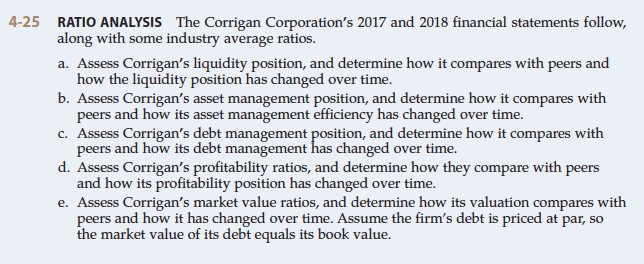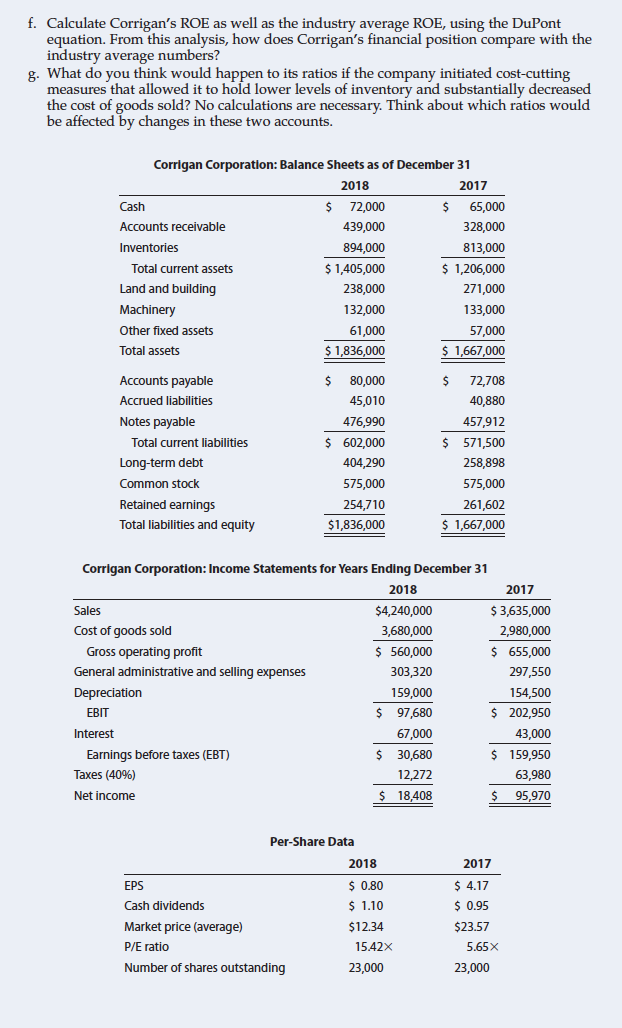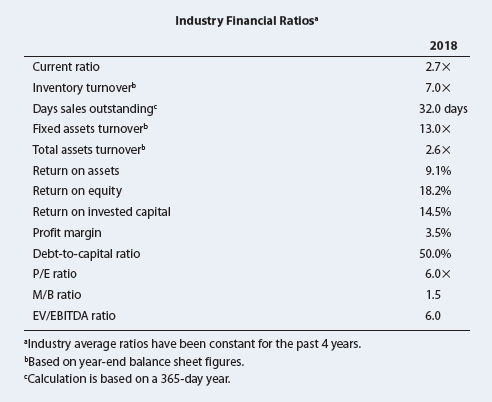4-25 RATIO ANALYSIS The Corrigan Corporations 2017 and 2018 financial statements follow,
along with some industry average ratios.
a. Assess Corrigans liquidity position, and determine how it compares with peers and
how the liquidity position has changed over time.
b. Assess Corrigans asset management position, and determine how it compares with
peers and how its asset management efficiency has changed over time.
c. Assess Corrigans debt management position, and determine how it compares with
peers and how its debt management has changed over time.
d. Assess Corrigans profitability ratios, and determine how they compare with peers
and how its profitability position has changed over time.
e. Assess Corrigans market value ratios, and determine how its valuation compares with
peers and how it has changed over time. Assume the firms debt is priced at par, so
the market value of its debt equals its book value
f. Calculate Corrigans ROE as well as the industry average ROE, using the DuPont
equation. From this analysis, how does Corrigans financial position compare with the
industry average numbers?
g. What do you think would happen to its ratios if the company initiated cost-cutting
measures that allowed it to hold lower levels of inventory and substantially decreased
the cost of goods sold? No calculations are necessary. Think about which ratios would
be affected by changes in these two accounts.



4-25 RATIO ANALYSIS The Corrigan Corporation's 2017 and 2018 financial statements follow, along with some industry average ratios. a. Assess Corrigan's liquidity position, and determine how it compares with peers and how the liquidity position has changed over time. b. Assess Corrigan's asset management position, and determine how it compares with peers and how its asset management efficiency has changed over time. C. Assess Corrigan's debt management position, and determine how it compares with peers and how its debt management has changed over time. d. Assess Corrigan's profitability ratios, and determine how they compare with peers and how its profitability position has changed over time. e. Assess Corrigan's market value ratios, and determine how its valuation compares with peers and how it has changed over time. Assume the firm's debt is priced at par, so the market value of its debt equals its book value. f. Calculate Corrigan's ROE as well as the industry average ROE, using the DuPont equation. From this analysis, how does Corrigan's financial position compare with the industry average numbers? g. What do you think would happen to its ratios if the company initiated cost-cutting measures that allowed it to hold lower levels of inventory and substantially decreased the cost of goods sold? No calculations are necessary. Think about which ratios would be affected by changes in these two accounts. Corrigan Corporation: Balance Sheets as of December 31 2018 2017 Cash $ 72,000 $ 65,000 Accounts receivable 439,000 328,000 Inventories 894,000 813,000 Total current assets $1,405,000 $ 1,206,000 Land and building 238,000 271,000 Machinery 132,000 133,000 Other fixed assets 61,000 57,000 Total assets $ 1,836,000 $ 1,667,000 Accounts payable Accrued liabilities Notes payable Total current liabilities Long-term debt Common stock Retained earnings Total liabilities and equity $ 80,000 45,010 476,990 $ 602,000 404,290 575,000 254,710 $1,836,000 $ 72,708 40,880 457,912 $ 571,500 258,898 575,000 261,602 $ 1,667,000 2018 Corrigan Corporation: Income Statements for Years Ending December 31 2017 Sales $4,240,000 $ 3,635,000 Cost of goods sold 3,680,000 2,980,000 Gross operating profit $ 560,000 $ 655,000 General administrative and selling expenses 303,320 297,550 Depreciation 159,000 154,500 EBIT $ 97,680 $ 202,950 Interest 67,000 43,000 Earnings before taxes (EBT) $ 30,680 $ 159,950 Taxes (40%) 12,272 63,980 Net income $ 18,408 $ 95,970 Per-Share Data 2018 EPS Cash dividends Market price (average) P/E ratio Number of shares outstanding $ 0.80 $ 1.10 $12.34 15.42x 23,000 2017 $ 4.17 $ 0.95 $23.57 5.65 23,000 Industry Financial Ratios 2018 27x 7.0% 32.0 days 13.0x 2.6X 9.1% 18.2% Current ratio Inventory turnover Days sales outstanding Fixed assets turnoverb Total assets turnoverb Return on assets Return on equity Return on invested capital Profit margin Debt-to-capital ratio P/E ratio M/B ratio EV/EBITDA ratio Industry average ratios have been constant for the past 4 years. Based on year-end balance sheet figures. Calculation is based on a 365-day year. 14.5% 3.5% 50.0% 6.0X 1.5 6.0









